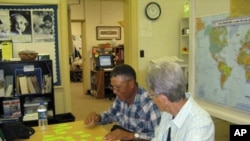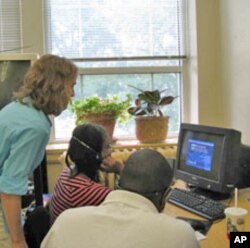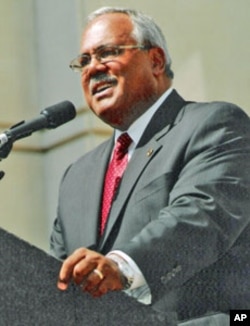One in four American adults cannot read or write well enough to function on the job and in everyday life.
Government surveys indicate that a quarter of American adults are, what is termed, functionally illiterate. That puts them at a disadvantage in an economy that's increasingly knowledge-based.
A number of concerned groups in Nashville, Tennessee are joining forces to fight adult illiteracy and boost economic development in the city.
Hidden shame
Joe Buford runs his own painting company in Nashville, Tennessee.
Before that, the 63 year old spent 25 years at a shipping company. None of his coworkers knew he was hiding a serious problem.
"Nobody there on the job knew I couldn't read," he says. "I was shipping stuff all over, everywhere throughout Tennessee and out of state, but when I ran into something I didn't understand and I needed somebody to tell me something, I would call my wife at home and would spell whatever words I needed to know and she would tell me what it was."
Buford dropped out of high school, and admits he wasn't focused on his education before that. For years, he says, he hid his inability to read because he was ashamed.
"I just felt like everybody else went off and left me and it looked like I was the only one in the United States who couldn't read," he says. "Ninety percent of my friends are college graduates, from doctors to school teachers and nurses. I always felt bad when I was in their midst. I just didn't feel worthy."
Facing fears
But six years ago, he decided to face his fear and learn to read. He turned to the Nashville Adult Literacy Council for help.
"I'm able now to read my mail and to know what's coming in. I don't have to hide anymore," he says. "It just made me feel very proud of myself. It kind of opened different doors for me."
Meg Nugent is executive director of the Nashville Adult Literacy Council. "It takes a very large act of courage on the part of our adult learners to come forward to ask for our help," she says. "Many times, of course, they think they are the only one with this problem."
Volunteer tutors with the nonprofit group work individually with adult learners. Nugent says asking for that help requires overcoming years of shame and self doubt.
"We've had learners say they didn't make the appointment and instead, they were driving around the block, too scared to come in," she says. "We've actually had grown, burly men crying at the enrollment process because they are just so terrified."
Economic impact
These days, Nugent sees more adults showing up at the literacy center.
"We believe the economy is making that happen. Basically when people lose their jobs or have a job issue, that's one of the biggest reasons they come to enroll in our program," she says. "Whereas, maybe in the past, they didn't feel they needed to or they weren't willing to come forward."
Illiteracy has become a serious economic problem, according to Howard Gentry, head of the Nashville Area Chamber of Commerce's Public Benefit Foundation. He points to a new study, commissioned by a local retail company, that calls for more attention to the issue.
"One in eight Nashvillians over the age of 16 — 52,000 Nashvillians — cannot read. Then we have 63,000 of adults 25 years and over [who] don't have a high school diploma," he says. "So, not only is it a quality of life issue for the individual, it's also an economic development issue for the city and the region because jobs require individuals to be literate."
Gentry says 22,000 middle level jobs requiring a college education will open up in Nashville over the next 10 years. That would translate into a 2,200-person shortage to fill those middle-level jobs.
Finding solutions
The Public Benefit Foundation is focused on finding solutions to socio-economic problems like poverty, homelessness and workforce development. Illiteracy, Gentry says, plays a role in all those problems.
Despite the variety of groups providing adult literacy classes, he says a more comprehensive approach is needed for the training to be effective.
"It would be great, through a coordinated effort, to be able to know which agencies and which organizations provide the literacy training for the different levels, so we can put people in their [appropriate] circumstances," he says. "The other thing is that we have to make sure that we are accessible."
That means ensuring there is adequate public transportation to get people to those programs. And that's not all. "We need to provide childcare for those who have issues around having their children taken care of while they are being trained. So there are a lot of wrap-around services," says Gentry.
By sharing their experiences, graduates of adult learning programs — like Joe Buford — are inspiring and encouraging others. Now a member of the Nashville Adult Literacy Council's board, Buford actively promotes adult education.
"I know it takes a lot to admit when you have a problem with anything but don't wait as long as I did," he says."Start early. It's going to change everything in your life."
That's the first step, he says, towards self improvement and more opportunities in work and life.















